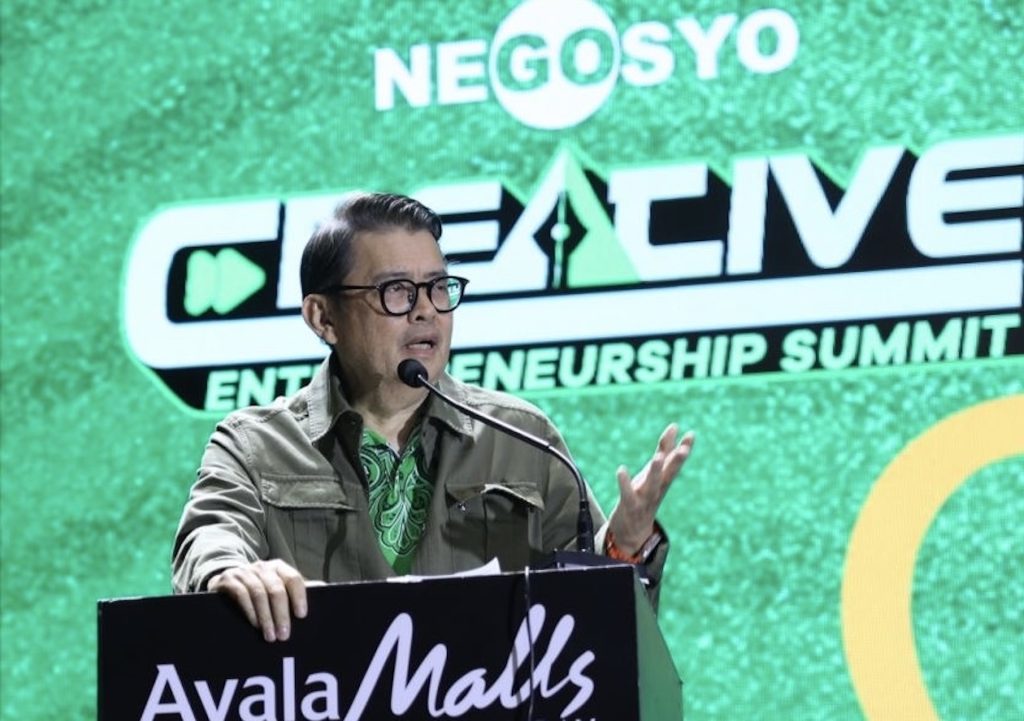
Go Negosyo Holds Back-To-Back Events for MSMEs in Luzon and Visayas
June 7, 2025
Trabaho and Negosyo on the Wage Hike Tightrope
June 16, 2025
Lessons and Takeaways on Entrepreneurship for Creatives
What a weekend. When we first embarked on putting together an entrepreneurship event to help creatives turn their passion into profit, we had an inkling that we were on to something. And last weekend’s Creative Entrepreneurship Summit delivered.
Not only did we attract so many creative talents to both learn and teach during the event, but we also walked away with a broader and deeper appreciation of creatives as entrepreneurs. We had visual artists, industrial designers, fashion retailers, textile enthusiasts, professional photographers, performing artists, publishing professionals, content creators and many more at the event, all bringing perspective into the topic. We also had people from the government side, like DTI Sec. Cris Roque, Cong. Toff de Venecia, Engr. Lilian Salonga of the DTI’s Bureau of Competitive Development, Marla Rausch of the Creative Content Creators Association, Kaye Tinga of the Cultural Center of the Philippines and Junie del Mundo of EON – all bringing perspective from the commercial side of being a creative in the Philippines.
There’s a future in anime and game design. This is the insight of our government’s trade department. From indications, there is much potential in animated series and books, especially when it’s built on original content. Filipinos have been in this business as outsourcers for many years, so it will be familiar territory. Our experts say we should capitalize on the Filipino’s rich history.
Develop confidence. Creatives need to keep on creating because this builds confidence. They need a supportive ecosystem that will allow them to make a living while pursuing their craft. They may need to engage the services of people who can handle things like filing taxes or handling logistics. For performers, they need an audience to complete the creative process, and keep on creating. The government has several programs to provide “audiences” for creatives, covering everything from food to textiles to crafts, and in collaboration with the performing arts.
Join an organization. There is strength in numbers. This is true especially in pushing for legislation and policy that support creatives. Freelancers can get advice, leads, support and protection from their peers in the industry. Through guilds, individual creatives gain representation.
Formalize the business. Freelancers make up a big chunk of the country’s creative industry, but many find it hard to go through the bureaucracy and red tape involved in establishing a business. But the inconvenience is minimal compared to being able to scale up the business to get bigger clients and corporate accounts. In fact, this advice is universal for all small entrepreneurs: formalize the business so it can be scaled up. Think big: once the business is running, systems need to be in place to handle things like accounting, logistics and HR. And yes, even creatives need to understand financial statements and learn to delegate. Don’t be afraid to ask for help; if you don’t, you will be headed for creative burnout, something which even the pros experience.
Be your own champion. The successful creatives who made it in the international market had to break down many doors. When you work with artisans and when presenting to people who may not be familiar with your work, you need to be a salesman and help them appreciate the work.
Know when to say no and never forget your why. You are, after all, a creative, so you have to stay true to your vision while still serving the client. This is a delicate balance, but in the end, it will fortify you against criticism and help you remember why you do what you do in the first place. In return, you will have to be consistent and deliberately build your reputation. Show up, do the work and continue to be good at what you do.
Cultivate an entrepreneur’s mindset. Creatives are sensitive people; sadly, there is no place for divas in business. You have to be always in the mood, you have to develop an appetite for criticism and you need to be a salesman because sometimes, even if you believe it to be true, the work can’t speak for itself. Develop a client mindset and see the work from their perspective.
Creatives want to create, more than anything. Most of the speakers we had at the Creative Entrepreneurship Summit said they started out knowing nothing about business, but that didn’t stop them from starting their businesses. There will be mentors who can guide you, and there will be people you can pay to help you with the un-creative parts. Being a creative isn’t easy, and as an entrepreneur, expect to wear several hats.
Originally Published in Philippine Star


2/F RFM Corporate Center, Pioneer cor. Sheridan Sts. Mandaluyong City, Metro Manila, Philippines

